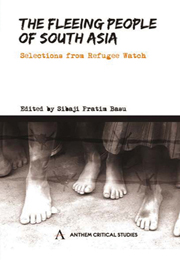Book contents
- Frontmatter
- Contents
- Acronyms and Abbreviations
- Foreword by Ranabir Samaddar
- Preface
- ETHICAL ISSUES
- LAWS
- SOUTH ASIA
- INDIA
- GENDER
- Introduction
- Refugee Repatriation: A Politics of Gender
- Families, Displacement, Partition
- Widows of Brindaban: Memories of Partition
- Agony Continues: Refugee Women of Bhutan
- Dislocating Women and Making the Nation
- Geder, Media and the Tsunami
- Why Should we Listen to Her?
- Women, Trafficking and Statelessness
- The Bar Dancer and the Trafficking Migrant: Globalization and Subaltern Existence
- INTERVIEW/CORRESPONDENCE
- REPRESENTATIONS
- Index
Agony Continues: Refugee Women of Bhutan
from GENDER
Published online by Cambridge University Press: 05 March 2012
- Frontmatter
- Contents
- Acronyms and Abbreviations
- Foreword by Ranabir Samaddar
- Preface
- ETHICAL ISSUES
- LAWS
- SOUTH ASIA
- INDIA
- GENDER
- Introduction
- Refugee Repatriation: A Politics of Gender
- Families, Displacement, Partition
- Widows of Brindaban: Memories of Partition
- Agony Continues: Refugee Women of Bhutan
- Dislocating Women and Making the Nation
- Geder, Media and the Tsunami
- Why Should we Listen to Her?
- Women, Trafficking and Statelessness
- The Bar Dancer and the Trafficking Migrant: Globalization and Subaltern Existence
- INTERVIEW/CORRESPONDENCE
- REPRESENTATIONS
- Index
Summary
Bhutan became a party to the UN Convention on the Elimination of All Forms of Discrimination Against Women (CEDAW) on 31 August 1981. But the situation of Bhutanese refugee women is appalling. Among the 100,000 Bhutanese refugees, around 50 per cent of the population in the refugee camps are women, most of these women are illiterate and they participate less in social activities. In the cultural sphere, the southern Bhutanese women had to bear the brunt of the government's cultural policy. The Bhutanese government forgetting its responsibility towards improving the status of women has deliberately attacked them in this campaign of ethnic cleansing. […] Southern Bhutanese women were deprived of their right to wear their dress; their ceremonial marriage necklaces were stripped off; they were made to cut their hair short. Instead, they were forced to adopt the dress and culture of the northern Bhutanese.
The women have always been the worst hit by government repression. In most cases, their husbands were imprisoned or had to flee the country for fear of persecution. The security forces plundered their homes, tortured, intimidated and raped these helpless women. There are 156 rape victims in Bhutanese refugee camps as per the records of CVICT Nepal. According to Shangri-La Without Human Rights eight women were raped to death. The following testimonies exemplify the extent to which women's rights have been violated by the Bhutanese government.
- Type
- Chapter
- Information
- The Fleeing People of South AsiaSelections from Refugee Watch, pp. 315 - 319Publisher: Anthem PressPrint publication year: 2009

